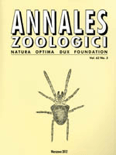
ANNALES ZOOLOGICI
Scope & Guideline
Pioneering Discoveries in Zoological Research
Introduction
Aims and Scopes
- Taxonomy and Systematics:
The journal publishes significant taxonomic revisions and descriptions of new species across various animal phyla, emphasizing the importance of accurate classification in understanding biodiversity. - Biodiversity Studies:
Research focusing on the distribution and ecological relationships of species is highlighted, providing insights into conservation and ecological dynamics. - Morphological and Phylogenetic Research:
Papers often investigate morphological characteristics and phylogenetic relationships, supporting the reconstruction of evolutionary histories and the classification of taxa. - Paleozoology:
The journal includes studies on extinct species, often based on fossil evidence, contributing to the understanding of historical biodiversity and evolutionary processes. - Ecology and Behavior:
Research also covers ecological aspects and behavioral studies of various species, enhancing knowledge of their roles in ecosystems.
Trending and Emerging
- Molecular Phylogenetics:
There is an increasing trend towards using molecular techniques to resolve taxonomic questions and understand evolutionary relationships, reflecting a broader shift in biological sciences towards genetic analysis. - Conservation Biology:
Research focusing on endangered species and conservation strategies is gaining attention, driven by the urgent need to address biodiversity loss globally. - Ecological Niche Modeling:
Studies that utilize ecological niche modeling to predict species distributions under climate change scenarios are becoming more common, highlighting the impact of environmental changes on biodiversity. - Interdisciplinary Approaches:
There is a growing trend towards interdisciplinary research that combines taxonomy with ecology, genetics, and environmental science, reflecting the complex nature of biodiversity studies. - Detailed Taxonomic Revisions:
The journal is increasingly publishing comprehensive revisions of specific taxa, which are critical for updating classification systems and understanding biodiversity.
Declining or Waning
- General Faunal Surveys:
While still present, general faunal surveys have decreased in frequency as more focused and detailed taxonomic studies gain prominence. - Morphological Studies Without Phylogenetic Context:
Purely morphological studies that do not incorporate phylogenetic analysis are becoming less common, as the field increasingly values integrative approaches. - Ecological Studies on Common Species:
Research focusing on well-studied or common species appears to be waning, with a shift towards more unique or endangered taxa that require urgent conservation attention. - Traditional Taxonomy without Molecular Methods:
The reliance on traditional morphological taxonomy alone has declined, as molecular techniques and genetic analyses are now preferred for resolving taxonomic ambiguities.
Similar Journals

ANNALES ZOOLOGICI FENNICI
Exploring Biodiversity Through Scientific InquiryANNALES ZOOLOGICI FENNICI, published by the Finnish Zoological Botanical Publishing Board, is a prominent scientific journal dedicated to advancing the fields of Animal Science, Zoology, Ecology, Evolution, Behavior, and Systematics. Based in Finland and serving an international audience, this journal has been an essential resource since its inception in 1974, offering valuable insights into biodiversity, conservation, and ecological dynamics. While it holds a respectable Q3 quartile ranking across several relevant categories in 2023, its impactful contributions to the scientific community continue to promote critical discussions and foster research collaborations. Although the journal is not currently open access, its robust indexing in Scopus and recognition within the academic community underscore its significance. As a researcher, professional, or student, engaging with the ANNALES ZOOLOGICI FENNICI not only enriches your knowledge but also aligns you with the forefront of zoological research and conservation studies.
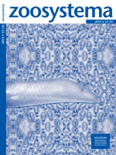
ZOOSYSTEMA
Advancing Biodiversity InsightsZOOSYSTEMA is a prestigious academic journal published by PUBLICATIONS SCIENTIFIQUES DU MUSEUM, PARIS, specializing in the fields of Animal Science, Zoology, and Ecology. With a focus on advancing the understanding of biodiversity and evolutionary processes, this journal serves as a vital platform for researchers to disseminate significant findings and foster discussions within the scientific community. Boasting an impressive categorization in the Q2 Quartile rankings for both its primary fields, ZOOSYSTEMA is recognized for its impact and quality, as indicated by its notable positions in the Scopus rankings. While currently not Open Access, the journal provides essential insights and comprehensive reviews across its volumes published since 1998, making it a cornerstone in zoological and ecological research. Researchers, professionals, and students alike will find ZOOSYSTEMA an invaluable resource for understanding complex biological systems and their interrelations, contributing to informed conservation and management efforts globally.
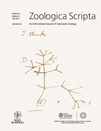
ZOOLOGICA SCRIPTA
Fostering innovation in genetics and evolutionary processes.Zoologica Scripta, published by Wiley, stands as a distinguished journal within the fields of Animal Science and Zoology, Ecology, Evolution, Behavior and Systematics, Genetics, and Molecular Biology. With its inception dating back to 1971 and a convergence year extending to 2024, this journal consistently provides a platform for high-quality research, earning a Q1 ranking in two key categories and solid performance in additional fields, as evidenced by its significant Scopus rankings and impressive percentiles. Notably, it ranks 36 out of 490 journals in Animal Science and Zoology, placing it in the 92nd percentile. While Zoologica Scripta operates under a traditional access model, its rigorous peer-review process ensures that only the most impactful studies make their way into its pages. With a focus on advancing our understanding of biodiversity and evolutionary processes, this journal is indispensable for researchers, professionals, and students committed to the ongoing exploration of animal sciences and ecological studies.
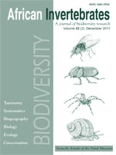
AFRICAN INVERTEBRATES
Illuminating Africa's Invertebrate Diversity and ChallengesAFRICAN INVERTEBRATES is a distinguished open-access academic journal published by the COUNCIL NATAL MUSEUM, specializing in the study of invertebrate biology within the vibrant ecosystems of Africa. Operating since 2006, this journal has established itself as a vital resource in the fields of Animal Science, Ecology, Evolution, Behavior, Insect Science, and Paleontology, earning a strong Q2 ranking in these categories as of 2023. With its ISSN 1681-5556 and E-ISSN 2305-2562, the journal provides unrestricted access to cutting-edge research, fostering collaboration among global researchers and professionals. AFRICAN INVERTEBRATES serves not only as a platform for high-quality scholarly articles but also aims to enhance the understanding of Africa's unique invertebrate fauna and the ecological challenges they face. With a commitment to innovation and excellence, the journal is pivotal for those looking to contribute to the discourse surrounding African biodiversity and conservation strategies.

RECORDS OF THE AUSTRALIAN MUSEUM
Bridging Past and Present through Scholarly ExplorationRecords of the Australian Museum is a leading journal in the fields of Animal Science, Ecology, History, and Museology, published by the renowned Australian Museum in Sydney, Australia. With a commitment to advancing knowledge and understanding of natural history and cultural heritage, this journal provides an essential platform for original research, reviews, and significant findings relevant to its diverse academic audience. The journal encompasses a broad scope, including studies in ecology, evolution, behavior, systematics, and the history of science, attracting contributions from leading scholars and professionals. Notably, it ranks highly in various categories, achieving a Q1 ranking in History and Museology, reflecting its impact and prestige within the academic community. Although it operates under a traditional access model, the journal ensures that its robust compilation of cutting-edge research remains vital to researchers, professionals, and students aiming to stay informed of the latest developments in their fields. With converging years of publication since 1983, Records of the Australian Museum continues to play a pivotal role in disseminating critical insights and fostering discussions that shape our understanding of both the natural world and our cultural heritage.

RAFFLES BULLETIN OF ZOOLOGY
Advancing Knowledge in Animal Science and EcologyRaffles Bulletin of Zoology, published by the National University of Singapore's Lee Kong Chian Natural History Museum, serves as a prestigious platform for the dissemination of cutting-edge research in Animal Science and Zoology, as well as Ecology, Evolution, Behavior and Systematics. With a current impact factor reflective of its Q2 category in both fields, this journal not only enhances its visibility in the academic community but also provides valuable insights into the complexities of biodiversity and conservation efforts. Covering a wide array of topics, Raffles Bulletin facilitates interdisciplinary collaboration and serves as an essential resource for researchers, professionals, and students alike. It is indexed in Scopus, ranking #233 out of 490 in Animal Science and Zoology and #406 out of 721 in Ecology, ensuring that the research published contributes significantly to the global discourse on wildlife and ecosystem management. Since its inception in 1996, this journal has bridged gaps in knowledge and continues to foster a deeper understanding of the living world.
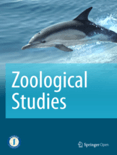
ZOOLOGICAL STUDIES
Fostering knowledge that inspires conservation efforts.Zoological Studies, published by the Biodiversity Research Center, Academia Sinica, stands as a pivotal journal in the fields of animal science and zoology. With the ISSN 1021-5506 and E-ISSN 1810-522X, this Taiwanese journal features a blend of pioneering research that spans over three decades, from 1994 to 2024, fostering a deep understanding of biodiversity and zoological phenomena. Recognized for its scholarly contributions, Zoological Studies holds an esteemed Q2 ranking in Animal Science and Zoology for 2023, positioning it among the top-tier journals in its category with a Scopus rank of #164 out of 490—reflecting its strong impact and outreach. While currently not open access, the journal aims to disseminate essential findings and discussions that advance ecological knowledge and inspire future research endeavors. Researchers, professionals, and students alike will find this journal an invaluable resource for accessing critical studies that drive innovation and conservation efforts in the field of zoology.
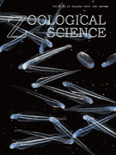
ZOOLOGICAL SCIENCE
Cultivating Knowledge for a Sustainable FutureZoological Science, published by the Zoological Society of Japan, is a leading journal dedicated to the fields of animal science and zoology. With its ISSN 0289-0003, this respected publication has established itself as a prominent source of scientific research, attaining a commendable Q2 ranking in the 2023 category of Animal Science and Zoology. Spanning over three decades, from 1992 to 2024, the journal offers a valuable platform for scholarly articles that explore various aspects of zoology, including ecology, behavior, and evolutionary biology. Although it operates under a traditional subscription model, its contributions are supported by a robust community of researchers and professionals who value its insights. The journal strives to foster academic discourse and insights that drive understanding and conservation of wildlife, making it an essential resource for students and established experts alike. The publishing headquarters located in Tokyo, Japan, further enhances its international reach and influence in zoological studies.

ACTA ENTOMOLOGICA MUSEI NATIONALIS PRAGAE
Advancing Knowledge in Entomological ScienceACTA ENTOMOLOGICA MUSEI NATIONALIS PRAGAE, published by the esteemed NARODNI MUZEUM - PRIRODOVECKE MUZEUM in the Czech Republic, is an influential journal in the fields of Ecology, Evolution, Behavior and Systematics, as well as Insect Science. With an ISSN of 0374-1036 and an E-ISSN of 1804-6487, this journal has established itself as a vital resource for researchers, professionals, and students interested in the intricate world of entomology. Spanning publications from 2005 to 2024, it is recognized for its contributions to the understanding of insect biology, offering insights on ecological interactions and evolutionary relationships. Although it operates as a subscription-based platform, the journal maintains a respectable presence in scholarly circles, positioned in the Q2 quartile for both relevant categories in 2023. ACTA ENTOMOLOGICA serves not only as a repository of significant empirical findings but also as a discourse platform for emerging entomological concepts, making it an essential read for those involved in the biological sciences.

European Journal of Taxonomy
Unveiling the intricacies of taxonomy and ecology.The European Journal of Taxonomy is a distinguished open access journal, published by the MUSEUM NATL HISTOIRE NATURELLE in France, dedicated to the rich and dynamic field of taxonomy, ecology, and systematics. Since its inception in 2011, this journal has aimed to provide a platform for the dissemination of high-quality research and innovative methods relevant to the study of biodiversity and species classification. With a commendable Q2 ranking in the Ecology, Evolution, Behavior and Systematics category as of 2023, the journal ranks 380 out of 721 in Scopus, highlighting its pivotal role in advancing scientific knowledge in these essential areas. Researchers and students alike will find valuable resources and contributions that address pressing ecological and evolutionary questions from 2015 to 2024. By promoting open access, the European Journal of Taxonomy ensures that vital research is accessible to a broader audience, fostering collaboration and discourse among professionals striving to enhance our understanding of the natural world.